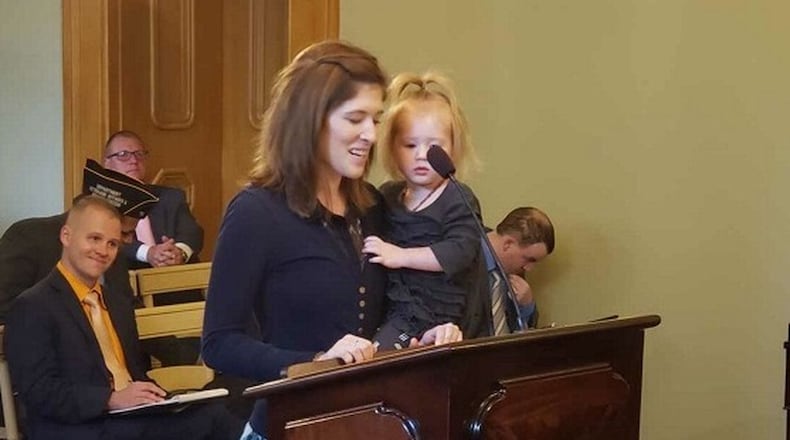“I was really shocked. I had heard that there were going to be hoops that I needed to jump through, but I had no idea…” she said. “I was devastated I just planned on not teaching.”
» RELATED: Nearly half of Wright-Patt’s 30K employees are close to retirement
McKinnon’s efforts culminated Thursday in the Ohio House of Representatives voting 92 to 0 to approve a bill that will make it easier for service members and their spouses to use their professional licenses from another state. It will now head to the State Senate and, if approved there, it will head Gov. Mike DeWine for his signature.
Military spouses look for a new job every one to three years and around 35 percent of them work in an occupation that requires some form of re-credentialing every time they move across state lines, according to White House data. Nearly all 50 states have begun streamlining the licensing process for military families, according to the White House.
Senate Bill 7 would require any state or local agency to issue temporary licenses and certificates to members of the military and their spouses who are licensed in other states and have moved to Ohio for active duty assignments. The agencies will be required to verify a person’s professional license and make sure it is in good standing.
There are around 1,300 Ohio military spouses that are employed in an occupation that requires some form of licensure or certification, State Rep. Jim Butler, R-Oakwood, has said. Wright-Patt, the largest single-site employer in Ohio, employs more than 30,000 people.
Perales, along with Butler, State Sen. Peggy Lehner, R-Kettering, State Sen. Bob Hackett, R-London, and then-State Sen. Bill Beagle, R-Tipp City, first introduced versions of bill into each house of the state legislature last year.
» RELATED: Wright-Patt could add 5K jobs in next five years
Perales praised his colleagues for their support of the bill and said it will “provide major long-term economic benefits to Ohio.”
“Ms. McKinnon’s testimonies and commitment to this issue has made a significant difference,” Perales said. “My hope is that we get this through the Senate and to the governor’s desk quickly.”
In the months since McKinnon said she first met Perales for coffee to discuss the licensure idea, she created a Facebook page where she posted updates about the status of the legislation.
As time has gone on, she’s heard from more people about her efforts. One person, a psychologist, told McKinnon that she can’t wait for the bill to become law so she can start practicing again.
Even U.S. Secretary of Defense Mark Esper caught wind of McKinnon’s push for license reciprocity.
Esper sent McKinnon a letter, thanking her for championing the cause. In the letter he also told McKinnon: “I intend to use your efforts as an example to encourage other states to adopt similar legislation.”
The attention and messages of praise McKinnon received have been both energizing and motivating, she said. But, McKinnon, who is a special needs teacher, said she’s most looking forward to getting back in the classroom soon.
“I didn’t know what I was capable of,” McKinnon said. “If I see something that’s not right, I can’t just sit by…It feels so good to be helping people.”
FIVE FAST READS
• Wright State president to step down at the end of the year
• Wright-Patt to help foster creation of flying cars for the military
• Central State trying to build on momentum from financial rebound
About the Author
